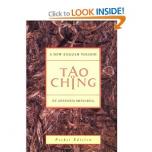tao te ching
The Tao Te Ching (pron. daodeching) is upwards of 2,500 years old and the identity of the author has never been established with any veracity. As much an eternal mystery as an eternal font of humour, good sense, wisdom and sustenance the way we get the book is as interesting as the book itself in many ways and reflects on western interpretation of eastern thought.
I had been reading some texts translated from a Buddhist Monk and was thinking how difficult it would be to convey everything from the original. Just as English still uses phrases from other languages; menage a trois, zeitgeist, quixotic, it is harder to find such devices in the more remote languages in the east. What an overwhelming task it must be to render a satisfactory translation of such a book despite it being relatively short.
Firstly there is the need to understand the language which would entail a working ability with more than just the tongue the translation is in since many of the notes about the text may come from a variety of different places and times. Then comes the need to understand what is being said, not in a literal way alone but allowing for nuances and poetic techniques. Finally comes the need to understand the work in a personal or spiritual sense which demands the translator plumb the depth of the spring and find the water of sufficient clarity. Both Mitchell and Le Guin worked from an existing translation from 1898 by Paul Carus but came to it in different ways which I find makes for two renditions of the same book but each a different palate.
A thorough look at Stephen Mitchell reveals him as an accomplished translator, author and poet. He has done a number of pieces which look at ancient spiritual texts as well as childrens books, adult books, poetry and parables on top of his copius works as a translator which occasionally have earned him high recognition. Mitchell gives us the translation in an accessible fashion and provides plenty of notes and a foreword which go a long way to informing the reader of relevant details which adds to our knowledge of the times and circumstances. Definitely good exercise without any pain but a necessary stretching of some of our preconceptions to accommodate the oriental universe.

Comments
tao te ching
I have had a liking of Le Guin's works going back to the late 70's and for a time went on a spree of reading her science-fiction. Not exhaustive but sufficient to develop a respect for her style and material. Her work with this title lived up to my expectations.
Although her work is not as academic as the one by Stephen Mitchell her comments are more in the nature of personal attitudes that lie behind her understanding of the work. If you are coming to the Tao Te Ching for the purpose of finding an understandable rendition supplemented with brief notes relating to the style and common themes in the original this volume will suit your needs without including the turgid academic information which may be of great interest to another reader making a serious study of the work and its place in Chinese philosophy and spirituality.